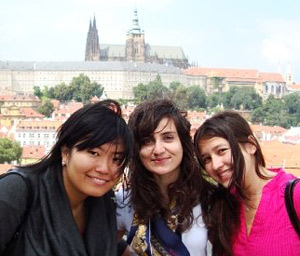Weidenfeld Scholarship Sends Ivanova ’10 to Oxford

Ten years from now, Daniela Ivanova ’10 envisions herself working as an advisor to a European commissioner or member of the Bulgarian government. Her next step in the quest will take place at the University of Oxford, in England.
Ivanova is a recipient of a Weidenfeld Scholarship and Leadership Programme for 2010-11. Awarded by the London-based Institute for Strategic, the scholarship will allow Bulgaria native Ivanova to pursue her career goal by supporting her studies on European politics and society at Oxford.
“Daniela came straight to Wesleyan from a high school in a remote Bulgarian provincial town,” says Peter Rutland, the Colin and Nancy Campbell Professor in Global Issues and Democratic Thought, professor of government and co-chair of the College of Social Studies. “Her excellent performance in the College of Social Studies, and her fluency in French and German, made her an ideal candidate for the Weidenfeld scholarship, which is aimed to train the next generation of East European leaders,”
Weidenfeld Scholars, who are supported by British philanthropist and publisher Sir George Weidenfeld, are selected for their intellectual distinction and exceptional leadership potential. The Leadership Programme provides the Scholars with the knowledge, skills and networks to contribute effectively to public life in their countries of origin and to build lasting professional linkages across cultures and continents.
Past Weidenfeld Scholarship recipient Karel Chromy ’08 suggested Ivanova apply for the scholarship.
“The fact that I can identify with the Weidenfeld Programme on a personal level was enough to fire up my enthusiasm for it,” Ivanova says. “I hope to gain the knowledge and intellectual flexibility to enable me to be an effective civil servant in the governing institutions of the European Union.”
In the College of Social Studies, Ivanova wrote her senior thesis on government corruption in Latvia and Bulgaria, countries whose political systems have been deeply penetrated by organized crime. Her argument focuses attention on the continuities of elite networks from Soviet times, as opposed to seeing crime as primarily a response to the arrival of market relations.

She explains why organized crime accompanies the transition period in both countries; whether their pre‐Communist and Communist histories affect its manifestations differently; and assesses how and to what extent the phenomenon affects these two young democracies and their role in the European Union.
At Oxford, she hopes to further investigate these areas by taking classes with faculty who research E.U.’s Eastward enlargement and post‐communist transitions, and faculty at Oxford’s Centre for Criminology.
Ivanova credits the College of Social Studies’ rigorous core curriculum and a study abroad experience at the Institut d’Etudes Politiques in Paris for providing her with the methodological tools necessary for the academic work at Oxford.
“Thinking critically about marginal and mainstream theories alike; developing algorithms for evaluation of arguments and evidence; and self‐proofing at every step are skills I am now confident in,” she says.
After earning a M.Phil in comparative politics, Ivanova hopes to pursue further specialization at the College d’Europe in Bruges, the most prestigious school for E.U. administration.
“The two degrees combined would boost my qualifications to join the substructures of either the European Commission or the Council of the European Union, and work for and towards one of the most unusual and most visionary projects of regional integration history has witnessed,” she says.

